Module 5 My school day 单元重点知识检测(含答案)
文档属性
| 名称 | Module 5 My school day 单元重点知识检测(含答案) | 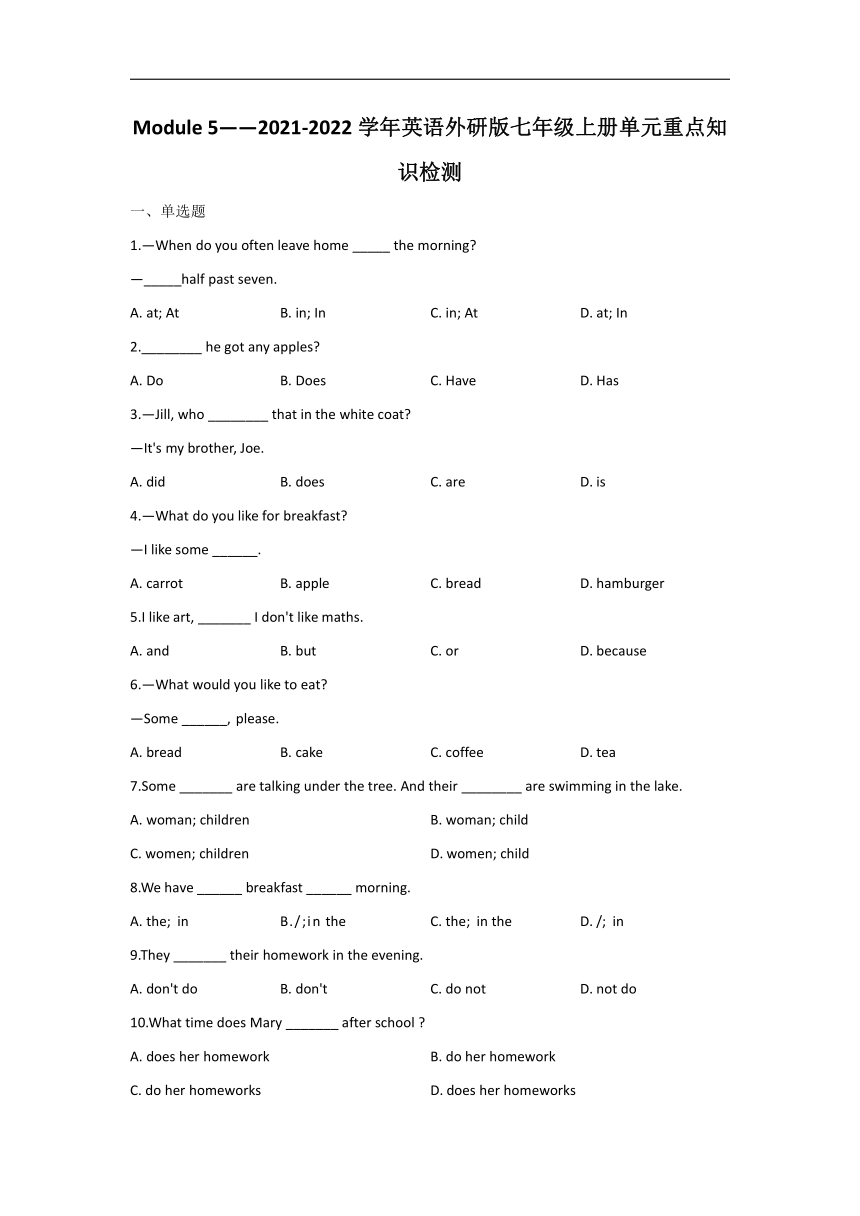 | |
| 格式 | docx | ||
| 文件大小 | 26.3KB | ||
| 资源类型 | 教案 | ||
| 版本资源 | 外研版 | ||
| 科目 | 英语 | ||
| 更新时间 | 2021-08-11 20:56:59 | ||
图片预览

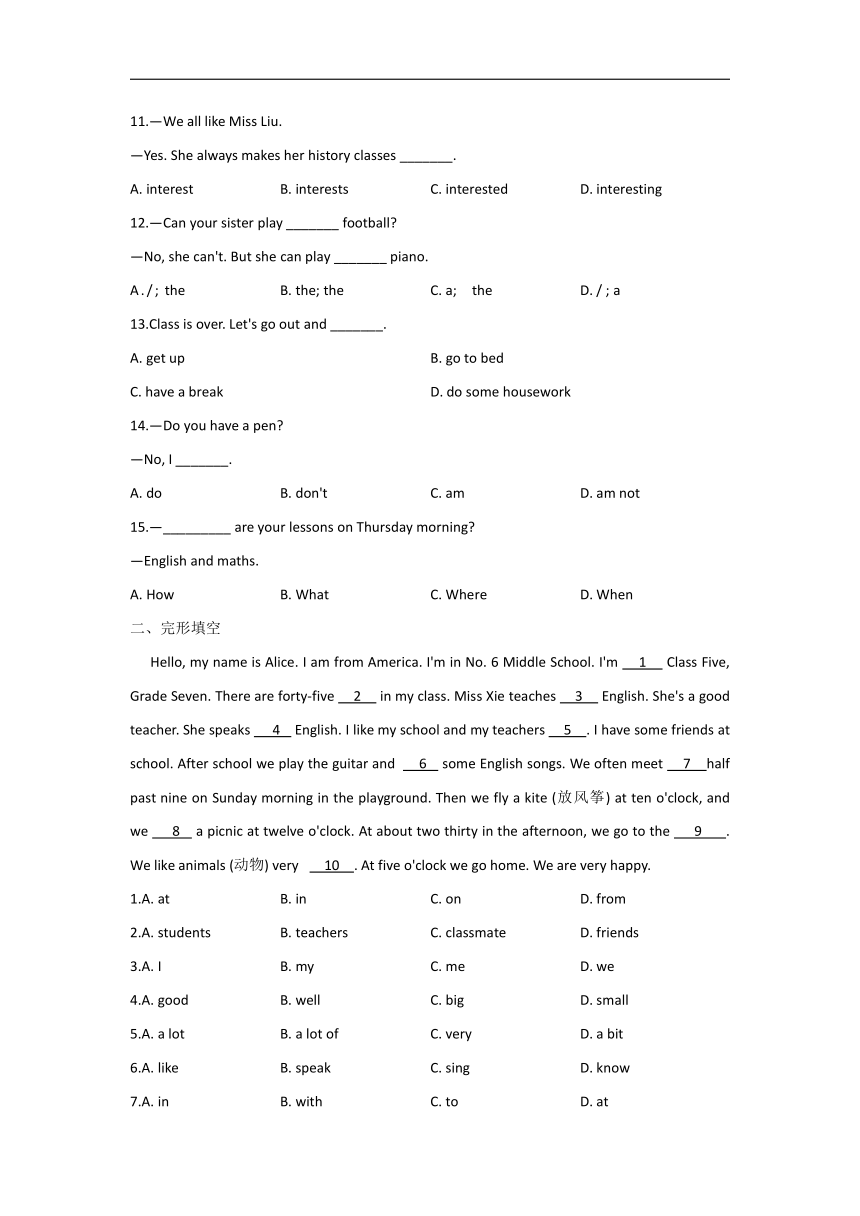
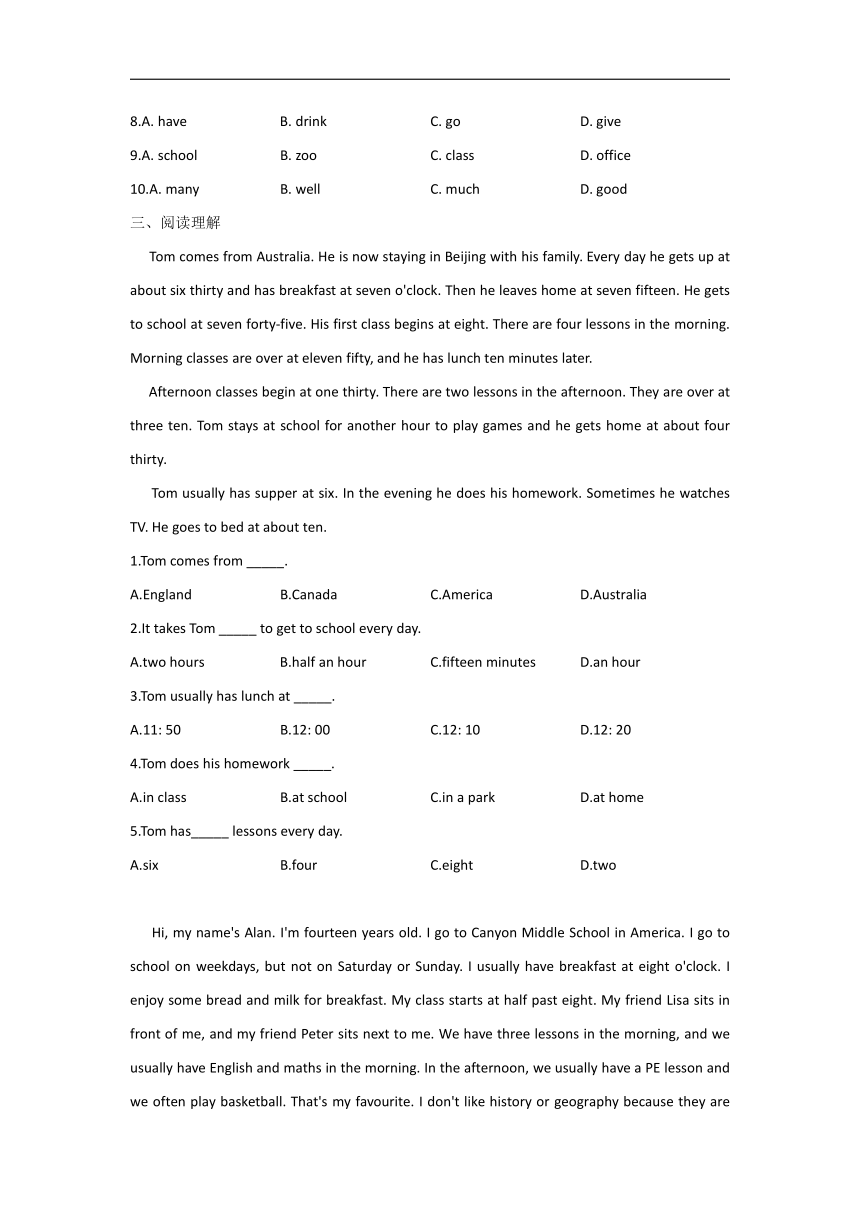
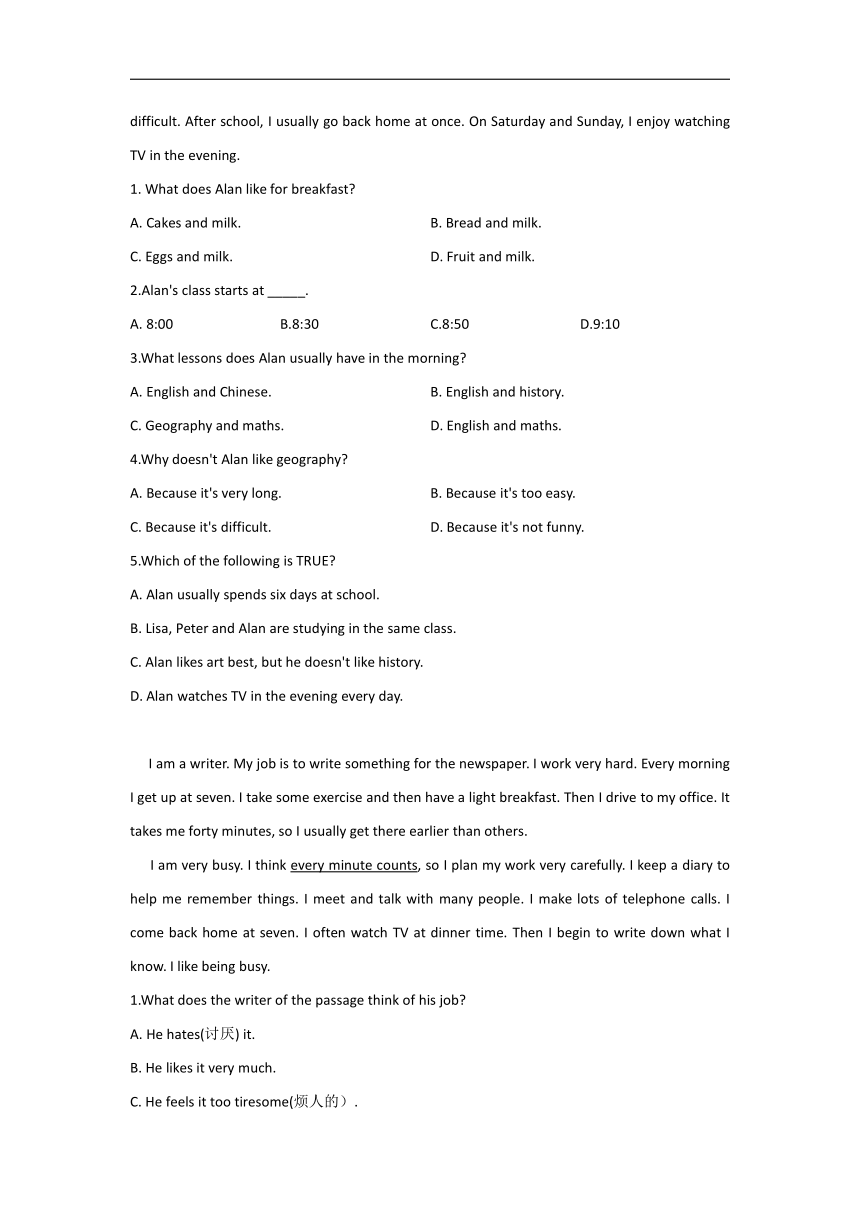
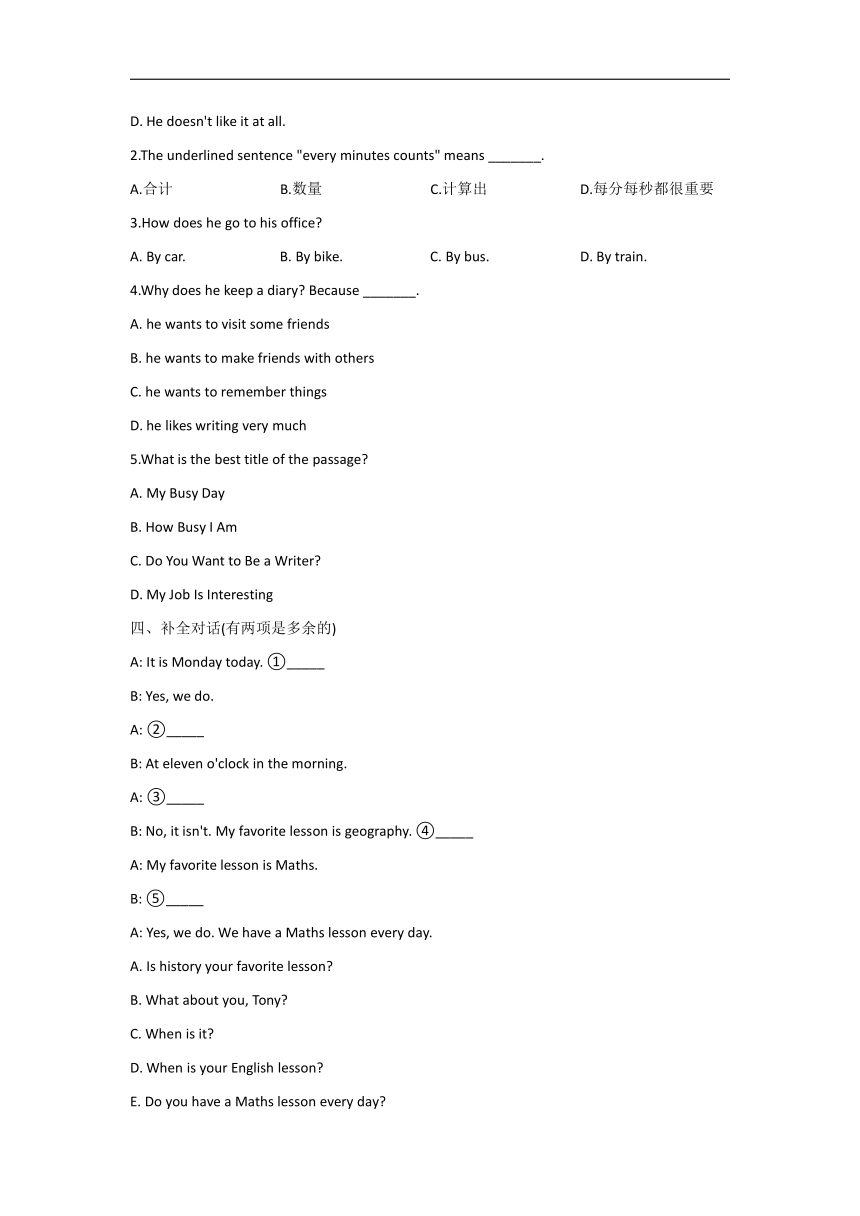
文档简介
Module 5——2021-2022学年英语外研版七年级上册单元重点知识检测
一、单选题
1.—When do you often leave home _____ the morning?
—_____half past seven.
A. at; At B. in; In C. in; At D. at; In
2.________ he got any apples?
A. Do B. Does C. Have D. Has
3.—Jill, who ________ that in the white coat?
—It's my brother, Joe.
A. did B. does C. are D. is
4.—What do you like for breakfast?
—I like some ______.
A. carrot B. apple C. bread D. hamburger
5.I like art, _______ I don't like maths.
A. and B. but C. or D. because
6.—What would you like to eat?
—Some ______, please.
A. bread B. cake C. coffee D. tea
7.Some _______ are talking under the tree. And their ________ are swimming in the lake.
A. woman; children B. woman; child
C. women; children D. women; child
8.We have ______ breakfast ______ morning.
A. the; in B./;in the C. the; in the D. /; in
9.They _______ their homework in the evening.
A. don't do B. don't C. do not D. not do
10.What time does Mary _______ after school ?
A. does her homework B. do her homework
C. do her homeworks D. does her homeworks
11.—We all like Miss Liu.
—Yes. She always makes her history classes _______.
A. interest B. interests C. interested D. interesting
12.—Can your sister play _______ football?
—No, she can't. But she can play _______ piano.
A./; the B. the; the C. a; the D. / ; a
13.Class is over. Let's go out and _______.
A. get up B. go to bed
C. have a break D. do some housework
14.—Do you have a pen?
—No, I _______.
A. do B. don't C. am D. am not
15.—_________ are your lessons on Thursday morning?
—English and maths.
A. How B. What C. Where D. When
二、完形填空
??? Hello, my name is Alice. I am from America. I'm in No. 6 Middle School. I'm??? 1?? ?Class Five, Grade Seven. There are forty-five??? 2?? ?in my class. Miss Xie teaches??? 3?? ?English. She's a good teacher. She speaks???? 4????English. I like my school and my teachers??? 5?? .?I have some friends at school. After school we play the guitar and???? 6????some English songs. We often meet??? 7?? half past nine on Sunday morning in the playground. Then we fly a kite (放风筝) at ten o'clock, and we???? 8????a picnic at twelve o'clock. At about two thirty in the afternoon, we go to the??? ?9 ?? . We like animals (动物) very? ?? 10?? . At five o'clock we go home. We are very happy.
1.A. at B. in C. on D. from
2.A. students B. teachers C. classmate D. friends
3.A. I B. my C. me D. we
4.A. good B. well C. big D. small
5.A. a lot B. a lot of C. very D. a bit
6.A. like B. speak C. sing D. know
7.A. in B. with C. to D. at
8.A. have B. drink C. go D. give
9.A. school B. zoo C. class D. office
10.A. many B. well C. much D. good
三、阅读理解
??? Tom comes from Australia. He is now staying in Beijing with his family. Every day he gets up at about six thirty and has breakfast at seven o'clock. Then he leaves home at seven fifteen. He gets to school at seven forty-five. His first class begins at eight. There are four lessons in the morning. Morning classes are over at eleven fifty, and he has lunch ten minutes later.
??? Afternoon classes begin at one thirty. There are two lessons in the afternoon. They are over at three ten. Tom stays at school for another hour to play games and he gets home at about four thirty.
??? Tom usually has supper at six. In the evening he does his homework. Sometimes he watches TV. He goes to bed at about ten.
1.Tom comes from _____.
A.England B.Canada C.America D.Australia
2.It takes Tom _____ to get to school every day.
A.two hours B.half an hour C.fifteen minutes D.an hour
3.Tom usually has lunch at _____.
A.11: 50 B.12: 00 C.12: 10 D.12: 20
4.Tom does his homework _____.
A.in class B.at school C.in a park D.at home
5.Tom has_____ lessons every day.
A.six B.four C.eight D.two
??? Hi, my name's Alan. I'm fourteen years old. I go to Canyon Middle School in America. I go to school on weekdays, but not on Saturday or Sunday. I usually have breakfast at eight o'clock. I enjoy some bread and milk for breakfast. My class starts at half past eight. My friend Lisa sits in front of me, and my friend Peter sits next to me. We have three lessons in the morning, and we usually have English and maths in the morning. In the afternoon, we usually have a PE lesson and we often play basketball. That's my favourite. I don't like history or geography because they are difficult. After school, I usually go back home at once. On Saturday and Sunday, I enjoy watching TV in the evening.
1. What does Alan like for breakfast?
A. Cakes and milk. B. Bread and milk.
C. Eggs and milk. D. Fruit and milk.
2.Alan's class starts at _____.
A. 8:00 B.8:30 C.8:50 D.9:10
3.What lessons does Alan usually have in the morning?
A. English and Chinese. B. English and history.
C. Geography and maths. D. English and maths.
4.Why doesn't Alan like geography?
A. Because it's very long. B. Because it's too easy.
C. Because it's difficult. D. Because it's not funny.
5.Which of the following is TRUE?
A. Alan usually spends six days at school.
B. Lisa, Peter and Alan are studying in the same class.
C. Alan likes art best, but he doesn't like history.
D. Alan watches TV in the evening every day.
??? I am a writer. My job is to write something for the newspaper. I work very hard. Every morning I get up at seven. I take some exercise and then have a light breakfast. Then I drive to my office. It takes me forty minutes, so I usually get there earlier than others.
??? I am very busy. I think every minute counts, so I plan my work very carefully. I keep a diary to help me remember things. I meet and talk with many people. I make lots of telephone calls. I come back home at seven. I often watch TV at dinner time. Then I begin to write down what I know. I like being busy.
1.What does the writer of the passage think of his job?
A. He hates(讨厌) it.
B. He likes it very much.
C. He feels it too tiresome(烦人的).
D. He doesn't like it at all.
2.The underlined sentence "every minutes counts" means _______.
A.合计 B.数量 C.计算出 D.每分每秒都很重要
3.How does he go to his office?
A. By car. B. By bike. C. By bus. D. By train.
4.Why does he keep a diary? Because _______.
A. he wants to visit some friends
B. he wants to make friends with others
C. he wants to remember things
D. he likes writing very much
5.What is the best title of the passage?
A. My Busy Day
B. How Busy I Am
C. Do You Want to Be a Writer?
D. My Job Is Interesting
四、补全对话(有两项是多余的)
A: It is Monday today. ①_____
B: Yes, we do.
A: ②_____
B: At eleven o'clock in the morning.
A: ③_____
B: No, it isn't. My favorite lesson is geography. ④_____
A: My favorite lesson is Maths.
B: ⑤_____
A: Yes, we do. We have a Maths lesson every day.
A. Is history your favorite lesson?
B. What about you, Tony?
C. When is it?
D. When is your English lesson?
E. Do you have a Maths lesson every day?
F. What do you do in the afternoon?
G. Do you have a history lesson today?
五、完成句子
1.我弟弟每天早上6:30起床。
My brother ______ ______?at half past six every morning.
2.他喜欢和朋友们在公园里玩。
He ______ ______?with his friends in the park.
3.我们上午上三节课。
We ________ three lessons in the morning.
4.可乐对你有害。
Cola _______ _______ _______ you.
5.你早饭吃什么?
What do you _____ _____ breakfast?
六、任务型阅读
Life in Britain
Homes and families
??? Many British people live in houses, not flats (公寓). Most houses have gardens.
Daily life (日常生活)
??? Most office (办公室)workers start work at about nine in the morning, and finish (结束) at about five or six in the afternoon. Most people don't go home for lunch, and they just have a quick meal.
School life
??? Children start school at about 9 am, and finish at about 3:30 pm. Most children have lunch at school. All children go to school when (当……的时候) they are four or five years old, and leave (离开) when they are sixteen or seventeen.
Shops
??? Most shops open at about 9 am and close at about 6 pm. Usually, they don't close for lunch.
Homes and families
Many?British?people?live in ① ______.
Daily life
Most?workers start?work?②______?and?finish work?③?______.
School life
Most children?④______ at school.
Shops
Most shops?⑤?______ for lunch.
七、根据上下文和首字母提示完成短文。
??? My name is Kathy. I'm a student. I g①_____ up at six every day. After b②_____, I go to s③_____ by bike. I listen to my teacher carefully in class and study very hard at school. I have l④_____ with my good friend, Kate, at school. I do sports with my classmates for an hour in the a⑤_____. T⑥_____ I go home at five o⑦_____, After a short rest, I cook for my parents. I have d⑧_____ with my parents at home. After that, I do my h⑨_____ and w⑩_____ TV. I go to bed at nine.
八、
假如你是李军,周五是你一周中最忙的一天,请你根据表格内容,以"My busy day"为题,向同学们介绍一下你这一天的活动。60词左右。
周五
6 :40
起床
7:00
吃早饭
8:00
开始上课(四节课)
14:00
开始上课(四节课)
5:30
回家
7:30
做作业
8:20
看电视
9:00
睡觉
My busy day
_______________________________________________________________________________________________________________________________________________________________________________________________________________________________________________________________
答案以及解析
一、
1.答案:C
解析:句意为:—早上你通常什么时候离开家?—在7:30。表示"在上午/下午/晚上"用介词in;表示"在具体的时刻"用介词at,故选C项。
2.答案:D
解析:have/ has got意为"有",其中have/has是助动词,在疑问句中可以提前,而主语he是第三人称单数,故选D项。
3.答案:D
解析:句意为:—吉尔,那个穿白色外套的人是谁?—他是我的哥哥(弟弟)乔。因为句中的主语是who,表示提问人的身份,所以其后的动词用is。故选D项。
4.答案:C
解析:some修饰不可数名词或可数名词复数。 carrot, apple和hamburger均是可数名词单数,只有 bread是不可数名词。故选C项。
5.答案:B
解析:句意为:我喜欢美术,但是我不喜欢数学。根据句意可知前后是转折关系,故选B项。
6.答案:A
解析:句意为:—你想要吃点什么?—请来些面包。咖啡和茶是喝的饮料,排除C,D;cake是可数名词,有some修饰时应该用复数形式,排除B项,故选A项。
7.答案:C
解析:some意为"一些",可以修饰可数名词的复数或不可数名词; woman的复数是 women,故排除A,B选项;根据第二句话中谓语动词are可知主语是复数形式,故选C项。
8.答案:B
解析:一日三餐前不加冠词;"在上午"用 in the morning表示,故选B项。
9.答案:A
解析:do homework中的do是行为动词,其后不能直接加not变否定式,应在其前面加助动词don't或 do not,故选A项。
10.答案:B
解析:句意为:玛丽放学后几点写作业?疑问句中加助动词does以后,原句中的动词要变为原形,排除A,D选项;而且 homework是不可数名词,故选B项。
11.答案:D
解析:句意为:—我们都喜欢刘老师。—是的。她总是让她的历史课很有趣。make用作使役动词时,常用" make sb/sth+形容词"结构,意为"使某人/某物怎么样";而且 history classes是物,用 interesting修饰,故选D项。
12.答案:A
解析:play与球类名词、棋类名词搭配前不加冠词,与西洋乐器名词搭配前加定冠词the,故选A项。
13.答案:C
解析:句意为:下课了。让我们出去休息休息。四个选项的含义分别为"起床","去睡觉","休息","写些作业",根据题意可知选C项。
14.答案:B
解析:助动词do开头的一般疑问句其否定答语为"No, sb don't/doesn't."根据句意可知选B项。
15.答案:B
二、
答案:1-5 BACAA 6-10 CDABC
解析:3.点拨:动词teach后接人称代词宾格形式。
4.点拨:句意为"她讲一口流利的英语",形容词good修饰名词English。
5.点拨:a lot"非常"与very much同义。
8.点拨:have a picnic举行野餐。
9.点拨:根据后句中"动物"可排除A、C和D,只剩下B项,意为"动物园"。
三、
答案:1-5 DBBDA
解析:1.细节理解题。由文章第一句" Tom comes from Australia."可知汤姆来自澳大利亚。故选D项。
2.细节理解题。由第一段中的" Then he leaves home at seven fifteen. He gets to school at seven forty-five."可知汤姆7:15离开家,7:45到学校,他每天花费半小时时间到达学校。故选B项。
3.细节理解题。由第一段最后一句" Morning classes are over at eleven fifty, and he has lunch ten minutes later."可知上午的课在11:50结束,汤姆10分钟后吃午饭,即12:00。故选B项。
4.推理判断题。由最后一段可推测汤姆是在家做作业。故选D项。
5.细节理解题。由第一段中的" There are four lessons in the morning."和第二段第二句" There are two lessons in the afternoon."可知汤姆每天上六节课。故选A项。
答案:1-5 BBDCB
解析:1.细节理解题。根据"I enjoy some bread and milk for breakfast."可知选B项。
2.细节理解题。根据"My class starts at half past eight."可知选B项。
3.细节理解题。根据"we usually have English and maths in the morning."可知选D项。
4.细节理解题。根据"I don't like history or geography because they are difficult."可知选C项。
5.推理判断题。根据"My friend Lisa sits in front of me, and my friend Peter sits next to me."可以推测莉萨(Lisa),彼得( Peter)和艾伦(Alan)在同一个班。
答案:1-5 BDACA
解析:1.推理判断题。根据第一段中的" I work very hard."和文章最后一句" I like being busy."可知选B项。
2.词义猜测题。根据后半句 so I plan my work very carefully可以推测出画线句子表示"每分每秒都很重要。"故选D项。
3.细节理解题。根据第一段中的" Then I drive to my office."可知选A项。
4.细节理解题。由" I keep a diary to help me remember thing."可知,作者写日记的原因是为了记住一些事情,故选C项。
5.主旨大意题。通读全文可知短文介绍了作者一天的工作生活,故选A项。
四、
答案:①-⑤ GCABE
五、
1.答案:gets up
2.答案:likes playing
3.答案:have
4.答案:is bad for
5.答案:have for
六、
答案:①houses
②at about nine in the morning
③at about five or six in the afternoon
④have lunch
⑤don't close
解析:①由" Many British people live in houses..."可知,答案为 houses。
②由"Most office workers start work at about nine in the morning…"可知大多数办公室职员的上班时间大约是在早上9点钟。
③由"...and finish at about five or six in the afternoon."可知,下班时间大约是下午的5点或6点。
④由" Most children have lunch at school."可知,答案为 have lunch。
⑤由材料的最后一句话"Usually, they don't close for lunch."可知,答案为 don't close。
七、
答案:① get ② breakfast ③school ④ lunch ⑤ afternoon ⑥Then ⑦o'clock ⑧dinner ⑨homework ⑩watch
八、
答案:
My busy day
Hello, I'm Li Jun. I'm always busy on Friday. In the morning, I get up at twenty to seven. Then I have breakfast at sever o'clock. Our lessons begin at eight. I have four lessons in the morning. Classes start at two in the afternoon. Then I have four lessons. At half past five, I go home. After dinner, at half past seven, I do my homework. Then after fifty minutes, I watch TV. At nine o'clock, I go to bed. I have a busy Friday, but I'm very happy.
一、单选题
1.—When do you often leave home _____ the morning?
—_____half past seven.
A. at; At B. in; In C. in; At D. at; In
2.________ he got any apples?
A. Do B. Does C. Have D. Has
3.—Jill, who ________ that in the white coat?
—It's my brother, Joe.
A. did B. does C. are D. is
4.—What do you like for breakfast?
—I like some ______.
A. carrot B. apple C. bread D. hamburger
5.I like art, _______ I don't like maths.
A. and B. but C. or D. because
6.—What would you like to eat?
—Some ______, please.
A. bread B. cake C. coffee D. tea
7.Some _______ are talking under the tree. And their ________ are swimming in the lake.
A. woman; children B. woman; child
C. women; children D. women; child
8.We have ______ breakfast ______ morning.
A. the; in B./;in the C. the; in the D. /; in
9.They _______ their homework in the evening.
A. don't do B. don't C. do not D. not do
10.What time does Mary _______ after school ?
A. does her homework B. do her homework
C. do her homeworks D. does her homeworks
11.—We all like Miss Liu.
—Yes. She always makes her history classes _______.
A. interest B. interests C. interested D. interesting
12.—Can your sister play _______ football?
—No, she can't. But she can play _______ piano.
A./; the B. the; the C. a; the D. / ; a
13.Class is over. Let's go out and _______.
A. get up B. go to bed
C. have a break D. do some housework
14.—Do you have a pen?
—No, I _______.
A. do B. don't C. am D. am not
15.—_________ are your lessons on Thursday morning?
—English and maths.
A. How B. What C. Where D. When
二、完形填空
??? Hello, my name is Alice. I am from America. I'm in No. 6 Middle School. I'm??? 1?? ?Class Five, Grade Seven. There are forty-five??? 2?? ?in my class. Miss Xie teaches??? 3?? ?English. She's a good teacher. She speaks???? 4????English. I like my school and my teachers??? 5?? .?I have some friends at school. After school we play the guitar and???? 6????some English songs. We often meet??? 7?? half past nine on Sunday morning in the playground. Then we fly a kite (放风筝) at ten o'clock, and we???? 8????a picnic at twelve o'clock. At about two thirty in the afternoon, we go to the??? ?9 ?? . We like animals (动物) very? ?? 10?? . At five o'clock we go home. We are very happy.
1.A. at B. in C. on D. from
2.A. students B. teachers C. classmate D. friends
3.A. I B. my C. me D. we
4.A. good B. well C. big D. small
5.A. a lot B. a lot of C. very D. a bit
6.A. like B. speak C. sing D. know
7.A. in B. with C. to D. at
8.A. have B. drink C. go D. give
9.A. school B. zoo C. class D. office
10.A. many B. well C. much D. good
三、阅读理解
??? Tom comes from Australia. He is now staying in Beijing with his family. Every day he gets up at about six thirty and has breakfast at seven o'clock. Then he leaves home at seven fifteen. He gets to school at seven forty-five. His first class begins at eight. There are four lessons in the morning. Morning classes are over at eleven fifty, and he has lunch ten minutes later.
??? Afternoon classes begin at one thirty. There are two lessons in the afternoon. They are over at three ten. Tom stays at school for another hour to play games and he gets home at about four thirty.
??? Tom usually has supper at six. In the evening he does his homework. Sometimes he watches TV. He goes to bed at about ten.
1.Tom comes from _____.
A.England B.Canada C.America D.Australia
2.It takes Tom _____ to get to school every day.
A.two hours B.half an hour C.fifteen minutes D.an hour
3.Tom usually has lunch at _____.
A.11: 50 B.12: 00 C.12: 10 D.12: 20
4.Tom does his homework _____.
A.in class B.at school C.in a park D.at home
5.Tom has_____ lessons every day.
A.six B.four C.eight D.two
??? Hi, my name's Alan. I'm fourteen years old. I go to Canyon Middle School in America. I go to school on weekdays, but not on Saturday or Sunday. I usually have breakfast at eight o'clock. I enjoy some bread and milk for breakfast. My class starts at half past eight. My friend Lisa sits in front of me, and my friend Peter sits next to me. We have three lessons in the morning, and we usually have English and maths in the morning. In the afternoon, we usually have a PE lesson and we often play basketball. That's my favourite. I don't like history or geography because they are difficult. After school, I usually go back home at once. On Saturday and Sunday, I enjoy watching TV in the evening.
1. What does Alan like for breakfast?
A. Cakes and milk. B. Bread and milk.
C. Eggs and milk. D. Fruit and milk.
2.Alan's class starts at _____.
A. 8:00 B.8:30 C.8:50 D.9:10
3.What lessons does Alan usually have in the morning?
A. English and Chinese. B. English and history.
C. Geography and maths. D. English and maths.
4.Why doesn't Alan like geography?
A. Because it's very long. B. Because it's too easy.
C. Because it's difficult. D. Because it's not funny.
5.Which of the following is TRUE?
A. Alan usually spends six days at school.
B. Lisa, Peter and Alan are studying in the same class.
C. Alan likes art best, but he doesn't like history.
D. Alan watches TV in the evening every day.
??? I am a writer. My job is to write something for the newspaper. I work very hard. Every morning I get up at seven. I take some exercise and then have a light breakfast. Then I drive to my office. It takes me forty minutes, so I usually get there earlier than others.
??? I am very busy. I think every minute counts, so I plan my work very carefully. I keep a diary to help me remember things. I meet and talk with many people. I make lots of telephone calls. I come back home at seven. I often watch TV at dinner time. Then I begin to write down what I know. I like being busy.
1.What does the writer of the passage think of his job?
A. He hates(讨厌) it.
B. He likes it very much.
C. He feels it too tiresome(烦人的).
D. He doesn't like it at all.
2.The underlined sentence "every minutes counts" means _______.
A.合计 B.数量 C.计算出 D.每分每秒都很重要
3.How does he go to his office?
A. By car. B. By bike. C. By bus. D. By train.
4.Why does he keep a diary? Because _______.
A. he wants to visit some friends
B. he wants to make friends with others
C. he wants to remember things
D. he likes writing very much
5.What is the best title of the passage?
A. My Busy Day
B. How Busy I Am
C. Do You Want to Be a Writer?
D. My Job Is Interesting
四、补全对话(有两项是多余的)
A: It is Monday today. ①_____
B: Yes, we do.
A: ②_____
B: At eleven o'clock in the morning.
A: ③_____
B: No, it isn't. My favorite lesson is geography. ④_____
A: My favorite lesson is Maths.
B: ⑤_____
A: Yes, we do. We have a Maths lesson every day.
A. Is history your favorite lesson?
B. What about you, Tony?
C. When is it?
D. When is your English lesson?
E. Do you have a Maths lesson every day?
F. What do you do in the afternoon?
G. Do you have a history lesson today?
五、完成句子
1.我弟弟每天早上6:30起床。
My brother ______ ______?at half past six every morning.
2.他喜欢和朋友们在公园里玩。
He ______ ______?with his friends in the park.
3.我们上午上三节课。
We ________ three lessons in the morning.
4.可乐对你有害。
Cola _______ _______ _______ you.
5.你早饭吃什么?
What do you _____ _____ breakfast?
六、任务型阅读
Life in Britain
Homes and families
??? Many British people live in houses, not flats (公寓). Most houses have gardens.
Daily life (日常生活)
??? Most office (办公室)workers start work at about nine in the morning, and finish (结束) at about five or six in the afternoon. Most people don't go home for lunch, and they just have a quick meal.
School life
??? Children start school at about 9 am, and finish at about 3:30 pm. Most children have lunch at school. All children go to school when (当……的时候) they are four or five years old, and leave (离开) when they are sixteen or seventeen.
Shops
??? Most shops open at about 9 am and close at about 6 pm. Usually, they don't close for lunch.
Homes and families
Many?British?people?live in ① ______.
Daily life
Most?workers start?work?②______?and?finish work?③?______.
School life
Most children?④______ at school.
Shops
Most shops?⑤?______ for lunch.
七、根据上下文和首字母提示完成短文。
??? My name is Kathy. I'm a student. I g①_____ up at six every day. After b②_____, I go to s③_____ by bike. I listen to my teacher carefully in class and study very hard at school. I have l④_____ with my good friend, Kate, at school. I do sports with my classmates for an hour in the a⑤_____. T⑥_____ I go home at five o⑦_____, After a short rest, I cook for my parents. I have d⑧_____ with my parents at home. After that, I do my h⑨_____ and w⑩_____ TV. I go to bed at nine.
八、
假如你是李军,周五是你一周中最忙的一天,请你根据表格内容,以"My busy day"为题,向同学们介绍一下你这一天的活动。60词左右。
周五
6 :40
起床
7:00
吃早饭
8:00
开始上课(四节课)
14:00
开始上课(四节课)
5:30
回家
7:30
做作业
8:20
看电视
9:00
睡觉
My busy day
_______________________________________________________________________________________________________________________________________________________________________________________________________________________________________________________________
答案以及解析
一、
1.答案:C
解析:句意为:—早上你通常什么时候离开家?—在7:30。表示"在上午/下午/晚上"用介词in;表示"在具体的时刻"用介词at,故选C项。
2.答案:D
解析:have/ has got意为"有",其中have/has是助动词,在疑问句中可以提前,而主语he是第三人称单数,故选D项。
3.答案:D
解析:句意为:—吉尔,那个穿白色外套的人是谁?—他是我的哥哥(弟弟)乔。因为句中的主语是who,表示提问人的身份,所以其后的动词用is。故选D项。
4.答案:C
解析:some修饰不可数名词或可数名词复数。 carrot, apple和hamburger均是可数名词单数,只有 bread是不可数名词。故选C项。
5.答案:B
解析:句意为:我喜欢美术,但是我不喜欢数学。根据句意可知前后是转折关系,故选B项。
6.答案:A
解析:句意为:—你想要吃点什么?—请来些面包。咖啡和茶是喝的饮料,排除C,D;cake是可数名词,有some修饰时应该用复数形式,排除B项,故选A项。
7.答案:C
解析:some意为"一些",可以修饰可数名词的复数或不可数名词; woman的复数是 women,故排除A,B选项;根据第二句话中谓语动词are可知主语是复数形式,故选C项。
8.答案:B
解析:一日三餐前不加冠词;"在上午"用 in the morning表示,故选B项。
9.答案:A
解析:do homework中的do是行为动词,其后不能直接加not变否定式,应在其前面加助动词don't或 do not,故选A项。
10.答案:B
解析:句意为:玛丽放学后几点写作业?疑问句中加助动词does以后,原句中的动词要变为原形,排除A,D选项;而且 homework是不可数名词,故选B项。
11.答案:D
解析:句意为:—我们都喜欢刘老师。—是的。她总是让她的历史课很有趣。make用作使役动词时,常用" make sb/sth+形容词"结构,意为"使某人/某物怎么样";而且 history classes是物,用 interesting修饰,故选D项。
12.答案:A
解析:play与球类名词、棋类名词搭配前不加冠词,与西洋乐器名词搭配前加定冠词the,故选A项。
13.答案:C
解析:句意为:下课了。让我们出去休息休息。四个选项的含义分别为"起床","去睡觉","休息","写些作业",根据题意可知选C项。
14.答案:B
解析:助动词do开头的一般疑问句其否定答语为"No, sb don't/doesn't."根据句意可知选B项。
15.答案:B
二、
答案:1-5 BACAA 6-10 CDABC
解析:3.点拨:动词teach后接人称代词宾格形式。
4.点拨:句意为"她讲一口流利的英语",形容词good修饰名词English。
5.点拨:a lot"非常"与very much同义。
8.点拨:have a picnic举行野餐。
9.点拨:根据后句中"动物"可排除A、C和D,只剩下B项,意为"动物园"。
三、
答案:1-5 DBBDA
解析:1.细节理解题。由文章第一句" Tom comes from Australia."可知汤姆来自澳大利亚。故选D项。
2.细节理解题。由第一段中的" Then he leaves home at seven fifteen. He gets to school at seven forty-five."可知汤姆7:15离开家,7:45到学校,他每天花费半小时时间到达学校。故选B项。
3.细节理解题。由第一段最后一句" Morning classes are over at eleven fifty, and he has lunch ten minutes later."可知上午的课在11:50结束,汤姆10分钟后吃午饭,即12:00。故选B项。
4.推理判断题。由最后一段可推测汤姆是在家做作业。故选D项。
5.细节理解题。由第一段中的" There are four lessons in the morning."和第二段第二句" There are two lessons in the afternoon."可知汤姆每天上六节课。故选A项。
答案:1-5 BBDCB
解析:1.细节理解题。根据"I enjoy some bread and milk for breakfast."可知选B项。
2.细节理解题。根据"My class starts at half past eight."可知选B项。
3.细节理解题。根据"we usually have English and maths in the morning."可知选D项。
4.细节理解题。根据"I don't like history or geography because they are difficult."可知选C项。
5.推理判断题。根据"My friend Lisa sits in front of me, and my friend Peter sits next to me."可以推测莉萨(Lisa),彼得( Peter)和艾伦(Alan)在同一个班。
答案:1-5 BDACA
解析:1.推理判断题。根据第一段中的" I work very hard."和文章最后一句" I like being busy."可知选B项。
2.词义猜测题。根据后半句 so I plan my work very carefully可以推测出画线句子表示"每分每秒都很重要。"故选D项。
3.细节理解题。根据第一段中的" Then I drive to my office."可知选A项。
4.细节理解题。由" I keep a diary to help me remember thing."可知,作者写日记的原因是为了记住一些事情,故选C项。
5.主旨大意题。通读全文可知短文介绍了作者一天的工作生活,故选A项。
四、
答案:①-⑤ GCABE
五、
1.答案:gets up
2.答案:likes playing
3.答案:have
4.答案:is bad for
5.答案:have for
六、
答案:①houses
②at about nine in the morning
③at about five or six in the afternoon
④have lunch
⑤don't close
解析:①由" Many British people live in houses..."可知,答案为 houses。
②由"Most office workers start work at about nine in the morning…"可知大多数办公室职员的上班时间大约是在早上9点钟。
③由"...and finish at about five or six in the afternoon."可知,下班时间大约是下午的5点或6点。
④由" Most children have lunch at school."可知,答案为 have lunch。
⑤由材料的最后一句话"Usually, they don't close for lunch."可知,答案为 don't close。
七、
答案:① get ② breakfast ③school ④ lunch ⑤ afternoon ⑥Then ⑦o'clock ⑧dinner ⑨homework ⑩watch
八、
答案:
My busy day
Hello, I'm Li Jun. I'm always busy on Friday. In the morning, I get up at twenty to seven. Then I have breakfast at sever o'clock. Our lessons begin at eight. I have four lessons in the morning. Classes start at two in the afternoon. Then I have four lessons. At half past five, I go home. After dinner, at half past seven, I do my homework. Then after fifty minutes, I watch TV. At nine o'clock, I go to bed. I have a busy Friday, but I'm very happy.
同课章节目录
- Starte
- Module 1 My teacher and my friends
- Module 2 My English lesson
- Module 3 My English book
- Module 4 My everyday life
- Module 1 My classmates
- Unit 1 Nice to meet you.
- Unit 2 I'm Wang Lingling and I'm thirteen years ol
- Unit 3 Language in use.
- Module 2 My family
- Unit 1 Is this your mum?
- Unit 2 These are my parents.
- Unit 3 Language in use.
- Module 3 My school
- Unit 1 There are thirty students in my class.
- Unit 2 The library is on the left of the playgroun
- Unit 3 Language in use.
- Module 4 Healthy food
- Unit 1 We've got lots of apples.
- Unit 2 Is your food and drink healthy?
- Unit 3 Language in use.
- Module 5 My school day
- Unit 1 I love history.
- Unit 2 We start work at nine o'clock.
- Unit 3 Language in use.
- Revision module A
- Module 6 A trip to the zoo
- Unit 1 Does it eat meat?
- Unit 2 The tiger lives in Asia.
- Unit 3 Language in use.
- Module 7 Computers
- Unit 1 How do I write my homework on the computer?
- Unit 2 When do you use a computer?
- Unit 3 Language in use.
- Module 8 Choosing presents
- Unit 1 I always like birthday parties.
- Unit 2 She often goes to concerts.
- Unit 3 Language in use.
- Module 9 People and places
- Unit 1 We're enjoying the school trip a lot.
- Unit 2 They're waiting for buses or trains.
- Unit 3 Language in use.
- Module 10 Spring Festival
- Unit 1 Are you getting ready for Spring Festival?
- Unit 2 My mother's cleaning our houses and sweepin
- Unit 3 Language in use.
- Revision module B
